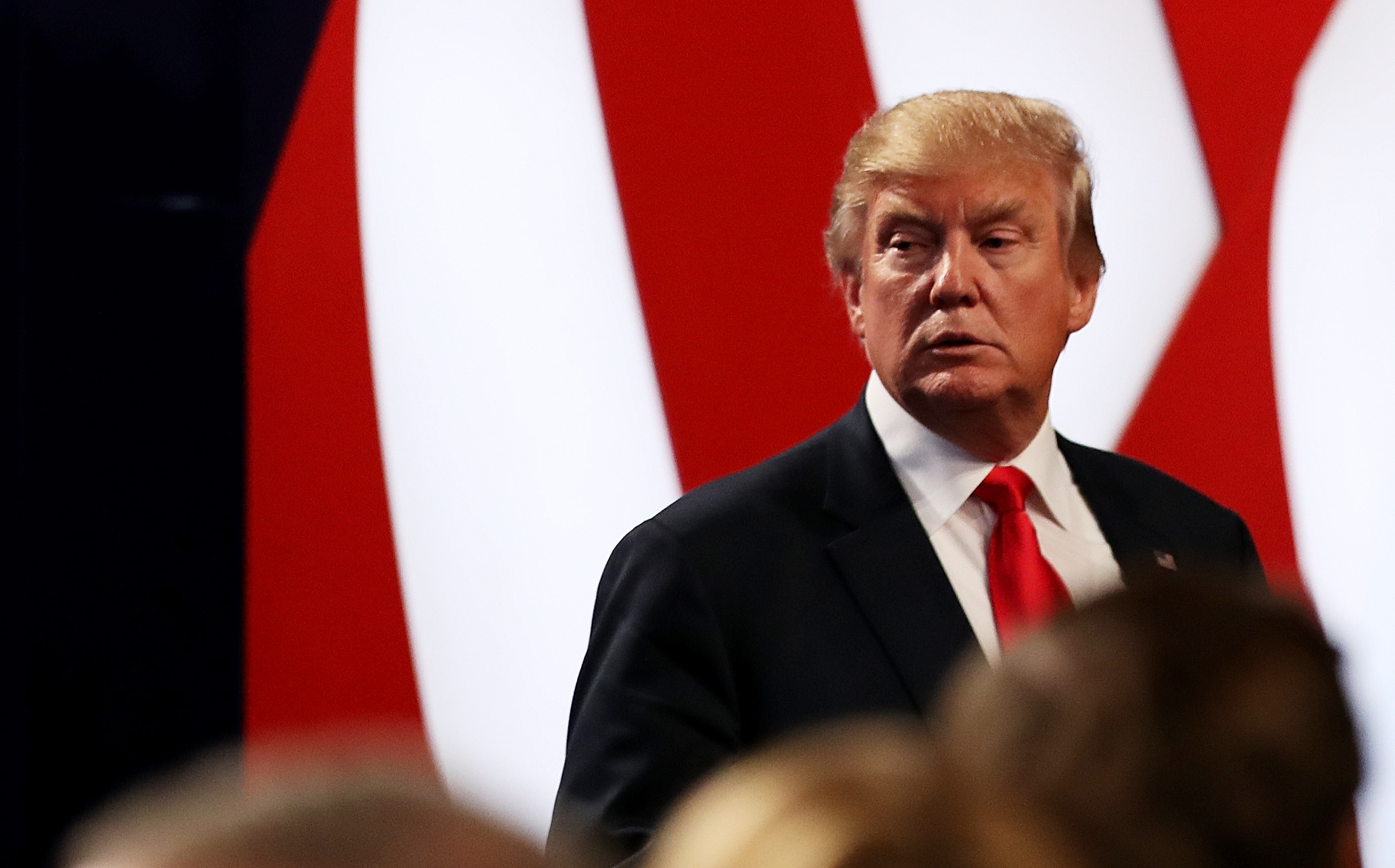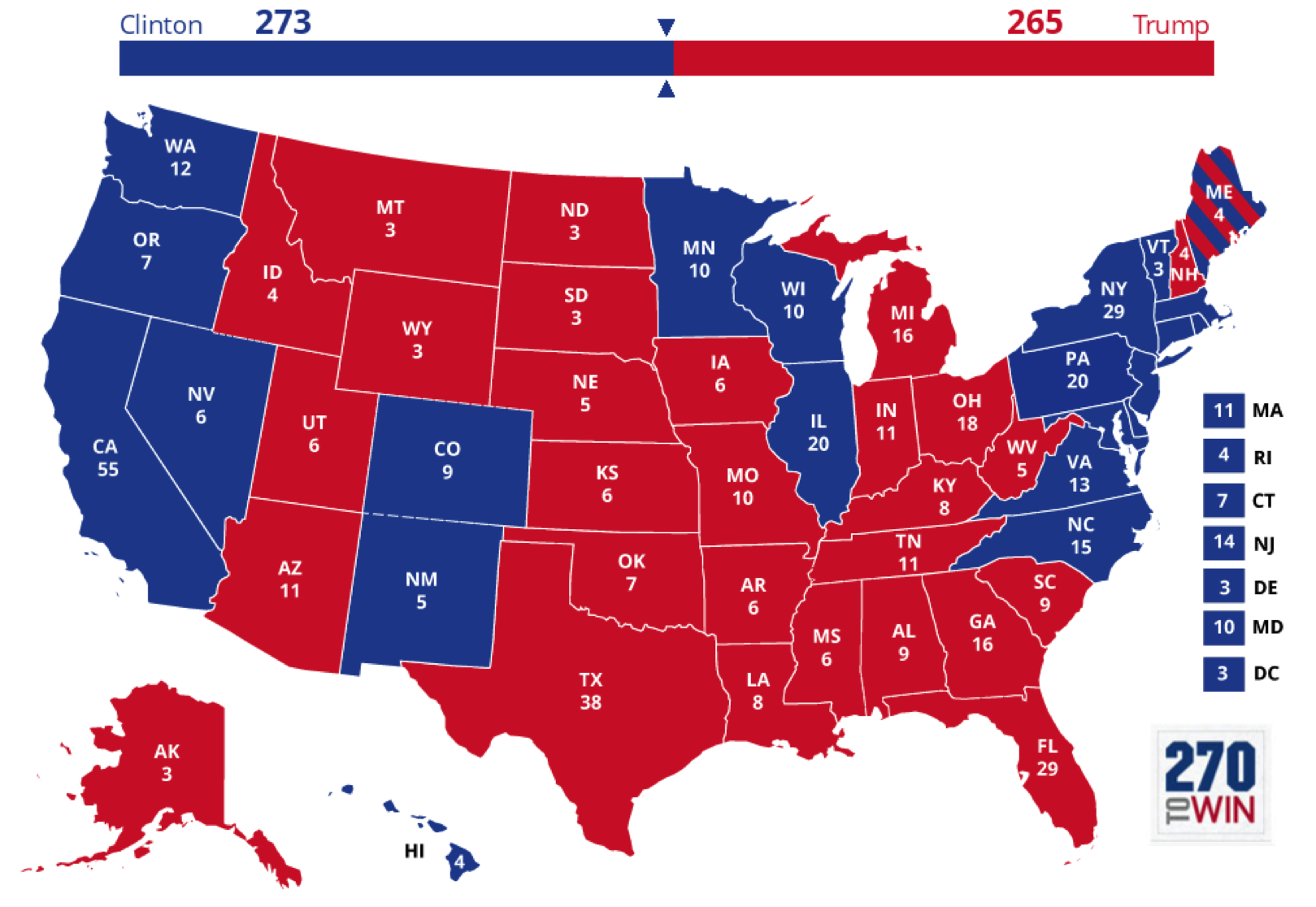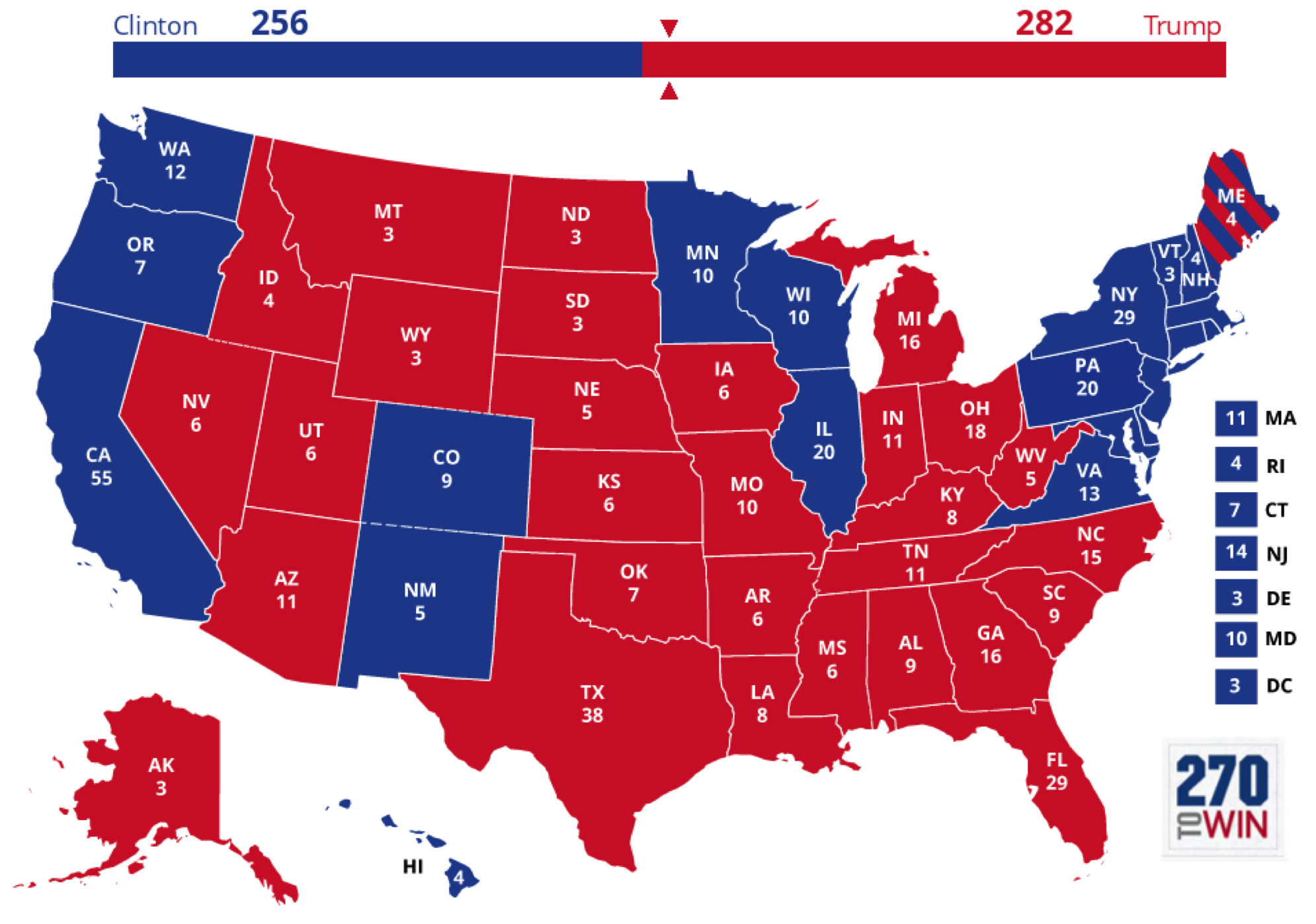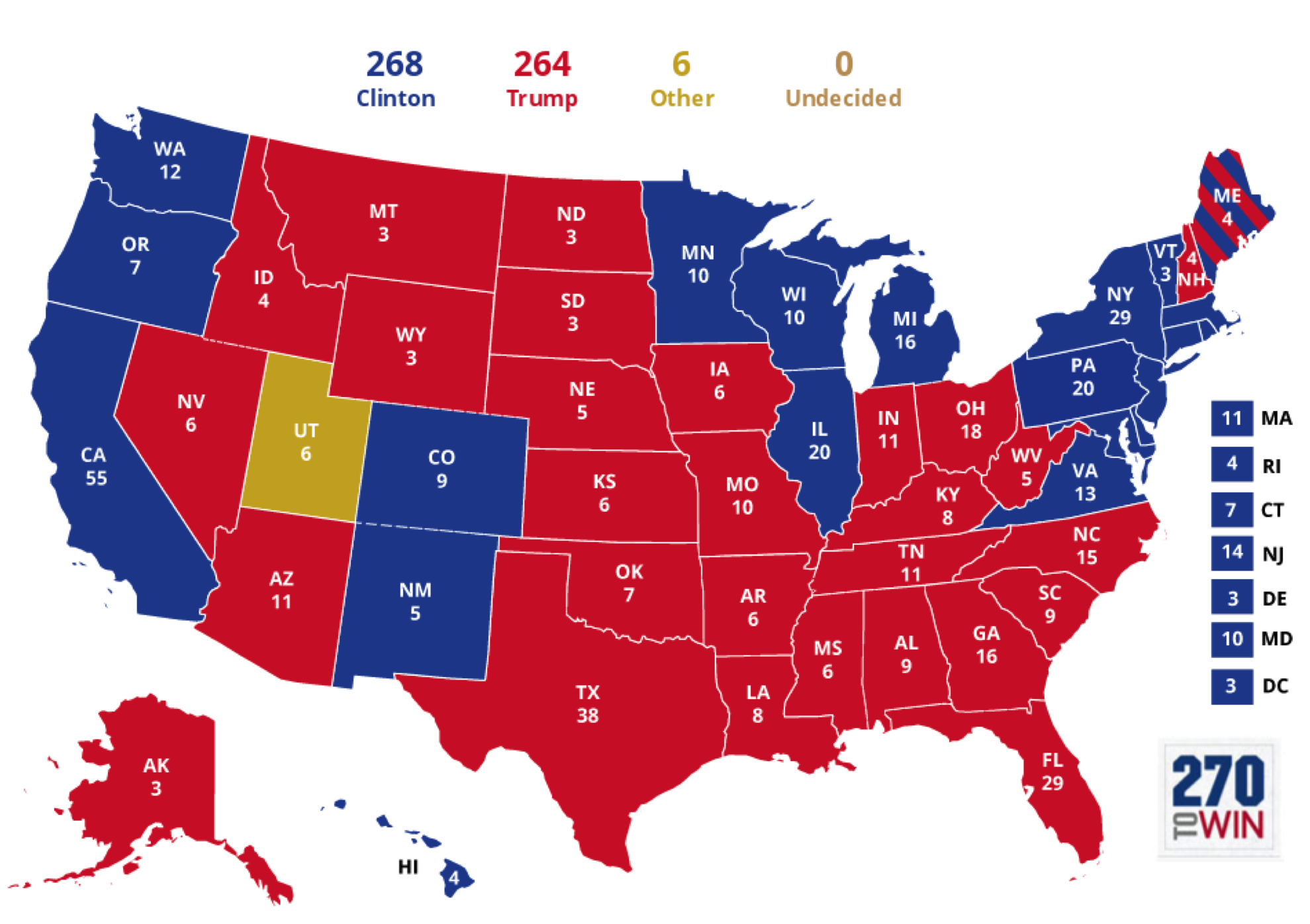These are the weirdest ways the election could end
As Hunter S. Thompson once said, "When the going gets weird, the weird turn pro"


There's less than one week to go before Election Day. Right now, it looks like Hillary Clinton is still significantly favored, and if she wins that the Democrats will likely control the Senate as well. But Donald Trump is clearly gaining ground, mostly because undecideds and Gary Johnson voters are coming home to the GOP. So it is possible that this thing will go down to the wire after all.
What then?
Hunter S. Thompson said, "When the going gets weird, the weird turn pro" — and if this election doesn't prove him right then nothing does. Here, then, are three weird photo finish scenarios that are still possible ends to this weirdest of elections.
The Week
Escape your echo chamber. Get the facts behind the news, plus analysis from multiple perspectives.

Sign up for The Week's Free Newsletters
From our morning news briefing to a weekly Good News Newsletter, get the best of The Week delivered directly to your inbox.
From our morning news briefing to a weekly Good News Newsletter, get the best of The Week delivered directly to your inbox.
1. Trump wins on Election Day, but loses the election.
Historically, early voting has skewed Democratic — and this year it seems likely to skew even more so because the polls are tightening very late in the game (though variability in African-American turnout and a surge in early voting by unaffiliated voters may tilt early voting the other way to some degree). What happens if Clinton wins the early vote, but loses the Election Day vote — albeit too narrowly to lose the election?
It might not matter if it isn't visible, any more than the fact that John Kerry led in the 2004 exit polls mattered once the ballots were counted and Bush had clearly won. But it could be visible — because while most states have early voting, not every state does. Three states vote only by mail, six require an excuse to vote absentee in person — and five states have no early voting at all: Connecticut, Rhode Island, New Hampshire, Pennsylvania, and Michigan.
Connecticut and Rhode Island will go for Clinton regardless. Clinton probably has a large enough lead in the other three to survive continued deterioration in the polls — but not necessarily. As the polls continue to tighten, expect the GOP to make a strong push in those three other states that don't have early voting — particularly since New Hampshire and Pennsylvania also have closely contested Senate contests.
A free daily email with the biggest news stories of the day – and the best features from TheWeek.com
So what happens if the final map looks something like this:

In this scenario, Clinton narrowly wins North Carolina on the strength of early voting. But the exit polls on Election Day show her losing not only North Carolina, but nationally — and, most important, she loses Michigan and New Hampshire, where all the voting happened on Election Day. Clinton would have won the election, but the GOP could — and certainly would — make a credible claim that by Nov. 8 the electorate had "changed its mind."
People are already worried about whether Trump will respect the process and concede if he loses. But in the foregoing scenario, you can be certain that not only he but his entire party would decry the result as frankly illegitimate. Clinton's presidency would be over before it even began.
2. Trump wins the Electoral College — but loses the popular vote.
Back in 2000, Al Gore won the national popular vote by less than 1 percent, but lost the election because he lost the vote in Florida by the narrowest of margins, which tipped the Electoral College to Bush. Though Democrats directed most of their anger at the Supreme Court for ordering an end to the recount, such a close election would have led to fierce recriminations regardless.
But 2016 could see a much more dramatic divergence between the popular vote and the Electoral College. Clinton has clearly led in national polls for nearly the entirety of the campaign, but her hold on a series of swing states — Ohio, Iowa, Nevada, Florida — has been far more tenuous. How can both things be true? Like most Democrats, Clinton is projected to win by large margins in large solid blue states like New York, Illinois, and California. But she is also doing much better than a typical Democrat in large red states like Texas and Georgia — reflecting the fact that her coalition skews more upscale and educated than Obama's did.
A point or two of Clinton's lead, then, is effectively "wasted" because it represents Hispanic voters in San Antonio and white collar professionals in the Atlanta suburbs who won't be able to put Clinton over the top in their states. It is possible — fairly likely, even — that if Clinton wins the national popular vote by less than 2 points, she could lose the Electoral College, with a map something like the following:

It was hard enough for the opposition to reconcile itself to conceding an election that was virtually tied. But if one candidate is the clear victor in the popular vote, while the other clearly wins the Electoral College, reconciliation will be almost unimaginable — particularly when the Republicans will almost certainly retain control of the House of Representatives in spite of losing the national popular vote for Congress.
Much of the commentary to date has revolved around whether Trump will concede or try to convince his voters that the election was stolen. But irredentism could just as easily plague the Democrats — and if something like the above happens, it almost certainly would.
3. Strategic voting by Utah Democrats throws the election to the House.
This is the weirdest scenario of all — but far from impossible. At her high water mark in the polls, Clinton looked to be within striking distance of a plurality in Utah — because anti-Trump Mormon Republicans were flocking to the banner of independent Evan McMullin. The race is still too close to be considered safe for Trump, but it seems less and less likely that Clinton could possibly wind up on top. In effect, she's now the spoiler in a contest between Trump and McMullin.
In most scenarios, of course, there would be nothing to spoil; the outcome of the Utah race won't matter no matter who wins it. But there is a scenario where it would matter greatly: Where the Electoral College is otherwise deadlocked. A scenario something like this:

This scenario and others like it aren't individually very likely. But they are possible — and they could be reason enough for Utah Democrats determined to stop Trump to throw their support behind McMullin.
If they did so, though, and the election was close enough to make a difference, they would not be voting for McMullin to secure a Clinton victory. Rather, they would throw the election to the House to decide — not on the basis of one vote per representative, but one vote per delegation. The GOP is very likely in any scenario to retain control of the House — and it is essentially certain to retain control of a majority of state delegations.
So if Utah Democrats voted strategically, they would put the House Republicans in charge of picking the next president from among the three candidates who would have won electoral votes.
Would the House GOP choose Trump, even if he failed to achieve a plurality in either the popular vote or the Electoral College, and failed precisely because a factional candidate won a single state running explicitly on a "stop Trump" platform? Probably. But what chance would there be of reconciling the opposition to an outcome that could not possibly be described as reflecting the will of the people? Indeed, in the wake of the explicit lobbying and threatening by all sides that would inevitably accompany such a vote in the House, what are the odds that the American people as a whole wouldn't throw up their hands in disgust at the complete degradation of our political system.
We should all hope things don't get that weird. But so far in this election, hope hasn't been much of a strategy.
Noah Millman is a screenwriter and filmmaker, a political columnist and a critic. From 2012 through 2017 he was a senior editor and featured blogger at The American Conservative. His work has also appeared in The New York Times Book Review, Politico, USA Today, The New Republic, The Weekly Standard, Foreign Policy, Modern Age, First Things, and the Jewish Review of Books, among other publications. Noah lives in Brooklyn with his wife and son.
-
 Why is Trump’s alleged strike on Venezuela shrouded in so much secrecy?
Why is Trump’s alleged strike on Venezuela shrouded in so much secrecy?TODAY'S BIG QUESTION Trump’s comments have raised more questions than answers about what his administration is doing in the Southern Hemisphere
-
 Vance’s ‘next move will reveal whether the conservative movement can move past Trump’
Vance’s ‘next move will reveal whether the conservative movement can move past Trump’Instant Opinion Opinion, comment and editorials of the day
-
 Why recognizing Somaliland is so risky for Israel
Why recognizing Somaliland is so risky for IsraelTHE EXPLAINER By wading into one of North Africa’s most fraught political schisms, the Netanyahu government risks further international isolation
-
 Bari Weiss’ ‘60 Minutes’ scandal is about more than one report
Bari Weiss’ ‘60 Minutes’ scandal is about more than one reportIN THE SPOTLIGHT By blocking an approved segment on a controversial prison holding US deportees in El Salvador, the editor-in-chief of CBS News has become the main story
-
 Has Zohran Mamdani shown the Democrats how to win again?
Has Zohran Mamdani shown the Democrats how to win again?Today’s Big Question New York City mayoral election touted as victory for left-wing populists but moderate centrist wins elsewhere present more complex path for Democratic Party
-
 Millions turn out for anti-Trump ‘No Kings’ rallies
Millions turn out for anti-Trump ‘No Kings’ ralliesSpeed Read An estimated 7 million people participated, 2 million more than at the first ‘No Kings’ protest in June
-
 Ghislaine Maxwell: angling for a Trump pardon
Ghislaine Maxwell: angling for a Trump pardonTalking Point Convicted sex trafficker's testimony could shed new light on president's links to Jeffrey Epstein
-
 The last words and final moments of 40 presidents
The last words and final moments of 40 presidentsThe Explainer Some are eloquent quotes worthy of the holders of the highest office in the nation, and others... aren't
-
 The JFK files: the truth at last?
The JFK files: the truth at last?In The Spotlight More than 64,000 previously classified documents relating the 1963 assassination of John F. Kennedy have been released by the Trump administration
-
 'Seriously, not literally': how should the world take Donald Trump?
'Seriously, not literally': how should the world take Donald Trump?Today's big question White House rhetoric and reality look likely to become increasingly blurred
-
 Will Trump's 'madman' strategy pay off?
Will Trump's 'madman' strategy pay off?Today's Big Question Incoming US president likes to seem unpredictable but, this time round, world leaders could be wise to his playbook
